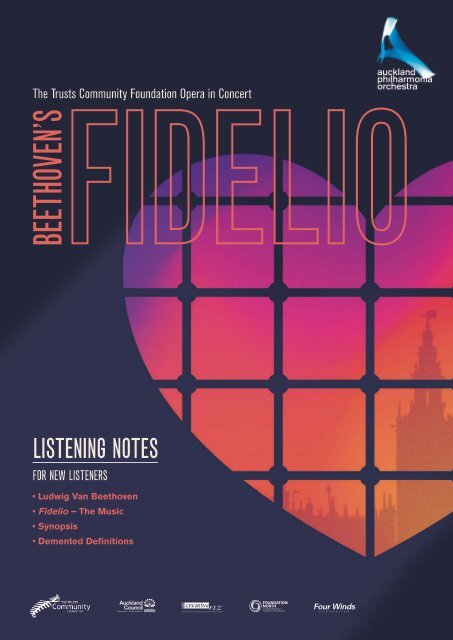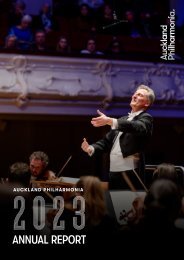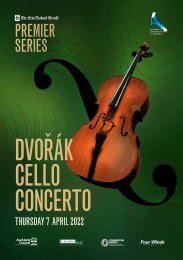Create successful ePaper yourself
Turn your PDF publications into a flip-book with our unique Google optimized e-Paper software.
<strong>The</strong> <strong>Trusts</strong> <strong>Community</strong> <strong>Foundation</strong> <strong>Opera</strong> <strong>in</strong> <strong>Concert</strong><br />
FIDELIO<br />
BEETHOVEN’S<br />
LISTENING NOTES<br />
FOR NEW LISTENERS<br />
• Ludwig Van Beethoven<br />
• <strong>Fidelio</strong> – <strong>The</strong> Music<br />
• Synopsis<br />
• Demented Def<strong>in</strong>itions
LUDWIG<br />
VAN BEETHOVEN<br />
(1770 – 1827)<br />
Libretto by Joseph Sonnleithner (1766-1835)<br />
/ Freidrich Trieitschke (1776-1842)<br />
after Jean-Nicolas Bouilly (1763-1842)<br />
COMPOSER PROFILE<br />
• Ludwig van Beethoven was born <strong>in</strong> Bonn, Germany.<br />
• As a young boy he would travel and perform on<br />
the piano. He was eventually successful enough to<br />
support his family.<br />
• Moved to Vienna <strong>in</strong> his early twenties, which was his<br />
home for the rest of his life.<br />
• One of the first composers to make a liv<strong>in</strong>g without<br />
be<strong>in</strong>g employed by the church or a member of the<br />
nobility.<br />
• When he was around 30 years old, he started to lose<br />
his hear<strong>in</strong>g. Despite his <strong>in</strong>ability to cont<strong>in</strong>ue play<strong>in</strong>g<br />
the piano, Beethoven composed some of his best and<br />
most successful music after he was deaf.<br />
• He was completely deaf by his mid-40s.<br />
• Best known for his n<strong>in</strong>e symphonies, but he also wrote<br />
many other k<strong>in</strong>ds of music – chamber, choral, piano,<br />
str<strong>in</strong>g quartets, and an opera.<br />
We know that Beethoven was born <strong>in</strong> December 1770,<br />
but no one is sure of the exact date. For years, he thought<br />
he was born <strong>in</strong> 1772. This may have been a deliberate<br />
deception from his father to make the musical prodigy<br />
seem younger and therefore, more advanced for his<br />
age than he was.<br />
DID YOU KNOW?<br />
A lock full of lead<br />
A young musician named Ferd<strong>in</strong>and Hiller snipped<br />
off a lock of hair from the great composer’s head as a<br />
keepsake. This was a common custom <strong>in</strong> their time. It<br />
was passed down through generations and eventually<br />
purchased by a collector. <strong>The</strong>y put the brown, grey and<br />
white strands through many imag<strong>in</strong>g, DNA, chemical,<br />
forensic and toxicology tests.<br />
<strong>The</strong> tests found that there was an abnormally elevated<br />
lead level, potentially <strong>in</strong>dicat<strong>in</strong>g chronic lead poison<strong>in</strong>g.<br />
This could have caused Beethoven’s deafness.<br />
Further studies suggest he probably drank from a<br />
goblet conta<strong>in</strong><strong>in</strong>g lead. It should also be noted that<br />
w<strong>in</strong>e of that era often conta<strong>in</strong>ed lead as a sweetener.<br />
Other opera-tunities<br />
<strong>Fidelio</strong> is the only opera Beethoven completed, but<br />
throughout his life, he experimented repeatedly with<br />
the form. Among the operatic subjects he considered<br />
were Macbeth, Alexander the Great, Attila the Hun,<br />
Romulus and Remus (the mythological founders of<br />
Rome), and a libretto (story) titled Vesta’s Fire by<br />
Emanuel Schikaneder, the librettist for Mozart’s Die<br />
Zauberflöte (<strong>The</strong> Magic Flute).<br />
2
FIDELIO<br />
THE MUSIC<br />
• <strong>Fidelio</strong> (pronounced fuh-DAY-lee-oh) is Ludwig van<br />
Beethoven’s only opera. It is a German opera with<br />
spoken dialogue (s<strong>in</strong>gspiel) <strong>in</strong> two acts.<br />
• Set <strong>in</strong> a state prison, <strong>Fidelio</strong> tells the story of how<br />
Leonore, disguised as a prison guard named ‘<strong>Fidelio</strong>’,<br />
rescues her husband Florestan from death <strong>in</strong> a political<br />
prison.<br />
• <strong>The</strong> orig<strong>in</strong>al libretto (story), <strong>in</strong>spired by Jean Nicholas<br />
Bouilly’s French drama Léonore, was written by<br />
Joseph Von Sonnleithner. <strong>The</strong> scenario of <strong>Fidelio</strong><br />
fit Beethoven’s political outlook at the time as the<br />
story deals with themes of freedom, equality, and the<br />
brotherhood of man.<br />
• Beethoven began compos<strong>in</strong>g <strong>Fidelio</strong> <strong>in</strong> the year 1804,<br />
shortly after the French Revolution and around the<br />
beg<strong>in</strong>n<strong>in</strong>g of the Napoleonic Wars.<br />
• Beethoven wrote three versions of the opera, <strong>in</strong>clud<strong>in</strong>g<br />
four overtures, over the course of ten years. <strong>The</strong><br />
premiere performance took place at <strong>The</strong>atre an der<br />
Wien, <strong>in</strong> Vienna, Austria on 20 November, 1805. <strong>The</strong><br />
second version premiered <strong>in</strong> 1806 and the f<strong>in</strong>al version<br />
at the Kärntnertortheater <strong>in</strong> Vienna on 23 May, 1814.<br />
• <strong>Fidelio</strong> is often regarded as the second great German<br />
opera after Mozart’s <strong>The</strong> Magic Flute.<br />
SYNOPSIS<br />
Tabatha McFadyen<br />
BEFORE THE ACTION<br />
In the midst of political upheaval <strong>in</strong> Seville, Florestan has<br />
endeavoured to expose the corruption of his political<br />
rival, Don Pizarro. In retaliation, Pizarro illegally imprisons<br />
Florestan, and spreads rumours of his death. Florestan’s<br />
wife, Leonore, however, believes that her husband still<br />
lives. She hatches a plan to f<strong>in</strong>d him. She disguises<br />
herself as a boy – the eponymous <strong>Fidelio</strong> – and ga<strong>in</strong>s<br />
employment as a prison guard.<br />
ACT ONE<br />
We open with Marzell<strong>in</strong>e be<strong>in</strong>g romantically pursued by<br />
Jaqu<strong>in</strong>o. He wants her to commit to marry<strong>in</strong>g him, but<br />
she refuses, for she is now <strong>in</strong> love with “<strong>Fidelio</strong>”. <strong>Fidelio</strong><br />
has recently arrived <strong>in</strong> the employment of her father –<br />
Rocco the gaoler – and everyone is unaware that <strong>Fidelio</strong><br />
is actually Leonore, Florestan’s wife (here referred to as<br />
<strong>Fidelio</strong> for consistency). <strong>Fidelio</strong> – not want<strong>in</strong>g to break the<br />
illusion – doesn’t outwardly protest when Rocco approves<br />
the marriage. Instead, she listens patiently while Rocco<br />
<strong>in</strong>sists that hav<strong>in</strong>g enough money is the key to a happy life.<br />
<strong>Fidelio</strong> counters: money is one th<strong>in</strong>g, but she would prefer<br />
to know that she has Rocco’s trust – someth<strong>in</strong>g that she<br />
suggests Rocco could prove by allow<strong>in</strong>g her to help <strong>in</strong><br />
the lower dungeons, where <strong>Fidelio</strong> th<strong>in</strong>ks Florestan may<br />
be imprisoned. Rocco refuses: he is under the strictest of<br />
3
orders from Pizarro – the governor of the gaol – to allow<br />
nobody else down there, but <strong>Fidelio</strong> <strong>in</strong>sists that she has<br />
enough courage and strength. Rocco relents and says he<br />
will ask Pizarro’s permission for <strong>Fidelio</strong> to assist him.<br />
Pizarro arrives. He receives a letter <strong>in</strong>form<strong>in</strong>g him that the<br />
Prime M<strong>in</strong>ister Fernando has a plan to <strong>in</strong>spect the prison,<br />
based upon rumours that political prisoners are be<strong>in</strong>g<br />
illegally held there. Pizarro knows that it will ru<strong>in</strong> him if<br />
Fernando discovers Florestan <strong>in</strong> particular, given that he<br />
had <strong>in</strong>formed him of Florestan’s death two years ago. He<br />
resolves to seize the moment and have his f<strong>in</strong>al revenge.<br />
Pizarro attempts to bribe Rocco <strong>in</strong>to kill<strong>in</strong>g Florestan, who<br />
refuses. <strong>The</strong>y <strong>in</strong>stead come to a compromise: Rocco will<br />
dig the prisoner’s grave, so that it will be ready for Pizarro<br />
to kill Florestan himself. <strong>Fidelio</strong> overhears the plot, and,<br />
although <strong>in</strong>itially terrified, resolves that she will not give up<br />
her goal to f<strong>in</strong>d Florestan.<br />
In an effort to look for Florestan among their ranks,<br />
<strong>Fidelio</strong> – aided by Marzell<strong>in</strong>e – conv<strong>in</strong>ces Rocco to let the<br />
prisoners come outside, to their overwhelm<strong>in</strong>g relief and<br />
joy. Rocco returns to tell <strong>Fidelio</strong> that Pizarro has given his<br />
permission for <strong>Fidelio</strong> to jo<strong>in</strong> him <strong>in</strong> the dungeon. As they<br />
leave, Jaqu<strong>in</strong>o and Marzell<strong>in</strong>e tell them that Pizarro knows<br />
that they let the prisoners out of the dungeons. When<br />
Pizarro enters <strong>in</strong> a fury, Rocco expla<strong>in</strong>s that they were<br />
lett<strong>in</strong>g them out to have some sunlight <strong>in</strong> honour of the<br />
K<strong>in</strong>g’s Name Day, and that Pizarro’s anger is best saved<br />
for the man he is about to kill. Pizarro orders the prisoners<br />
to be locked up aga<strong>in</strong>, and for Rocco and <strong>Fidelio</strong> to get to<br />
work digg<strong>in</strong>g Florestan’s grave.<br />
ACT TWO<br />
We now meet Florestan, alone and ail<strong>in</strong>g <strong>in</strong> his cell.<br />
He s<strong>in</strong>gs of his belief that, no matter how bitter the<br />
punishment, he has done the right th<strong>in</strong>g <strong>in</strong> speak<strong>in</strong>g the<br />
truth, and then has a vision of his wife Leonore com<strong>in</strong>g to<br />
save him. He falls asleep. Rocco and <strong>Fidelio</strong> arrive to dig<br />
the grave.<br />
Florestan awakes, and upon hear<strong>in</strong>g his voice, <strong>Fidelio</strong><br />
recognises the prisoner to be her husband. Once the<br />
grave has been dug, Rocco sounds the alarm to alert<br />
Pizarro that all is ready. He tells <strong>Fidelio</strong> to leave, but she<br />
hides <strong>in</strong>stead. Pizarro reveals his identity to Florestan,<br />
and just as he is about to kill him, <strong>Fidelio</strong>/Leonore throws<br />
herself between Pizarro’s dagger and her husband,<br />
threaten<strong>in</strong>g Pizarro with a pistol and reveal<strong>in</strong>g her true<br />
identity. Pizarro resolves to kill them both but is <strong>in</strong>terrupted<br />
by a trumpet announc<strong>in</strong>g the arrival of Fernando. Pizarro is<br />
led upstairs to him while Florestan and Leonore rejoice <strong>in</strong><br />
their reunion.<br />
Fernando frees those who have been wrongly imprisoned,<br />
much to the elation of the gathered crowd. Upon learn<strong>in</strong>g<br />
of Pizarro’s plot to murder Florestan, he orders his arrest.<br />
Rocco tells Fernando of how Leonore saved her husband,<br />
and Fernando allows her to release him from his cha<strong>in</strong>s.<br />
<strong>The</strong> crowd s<strong>in</strong>gs the praises of Leonore’s unmatched love<br />
and courage.<br />
OTHER OPERAS YOU MIGHT ENJOY:<br />
Bizet Carmen<br />
Mozart <strong>The</strong> Magic Flute<br />
Verdi La Traviata<br />
4
















